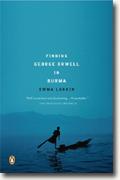Finding George Orwell in Burma
Emma Larkin
book reviews:
· general fiction
· chick lit/romance
· sci-fi/fantasy
· graphic novels
· nonfiction
· audio books
· author interviews
· children's books @
curledupkids.com
· DVD reviews @
curledupdvd.com
newsletter
win books
buy online
links
home
for authors
& publishers
for reviewers

 |
Finding George Orwell in Burma Emma Larkin Penguin Paperback 304 pages March 2006 |
|
Finding George Orwell in Burma is partially a travelogue but primarily an exploration of the five years Orwell spent in Burma as an officer of the Imperial Police Force, the effects of this experience on his writing, and how the Burma of today strongly resembles the totalitarian police state of Orwell’s 1984. Told with poetic, colorful language and full of pathos, it gives the reader a deeper insight into what triggered George Orwell’s imagination to write Burmese Days, Animal Farm, and 1984. The plight of the Burmese people is detailed very well, and one is left with the dread sense that what has happened over the course of years to this nation of 50 million people could be a glimpse of the future of many other nations, including the U.S.
“...their notebooks and photographic film are confiscated and they are swiftly deported. For the Burmese people they interview, the repercussions are infinitely greater. Under the country’s 1950 Emergency Provisions Act, providing foreigners with information that the regime considers inimical is punishable with a seven-year prison sentence.”The KGB has nothing on the rulers of Burma, who received training from same, or the Chinese Communists. There are no 1984-style telescreens, but there is a system of spies there – no one can know for sure who to place his or her trust in. The Burmese feel as if they’re always being watched, and one misstatement (or the lies of a neighbor who for some reason doesn’t like you) could send them to prison. Village authorities know about fights between husbands and wives, and anti-government statements by drunkards and others, and the jails such as Inseine Prison are full beyond capacity of mostly political prisoners. The punishments are frequent, being meted out, for example, “...if you asked for more rice or talked at the wrong time.” Each chapter commences with a quote from 1984. To the people of Burma, George Orwell is known as “the Prophet.” They are living in the type of world he wrote about on a daily basis. One way the generals of Burma control people is by controlling the very history of Burma and its place names. As one quote at the start of a chapter from 1984 states: “Who controls the past controls the future: who controls the present controls the past.” When a government changes its history and textbooks, and makes punishable mention of bad things that happened in a country’s past, the past is effectively under its control. 1988 is an ideal example of this happening in Burma. Much of the population took to the streets, shouting that they wanted “democracy” to come to their impoverished country. Instead, soldiers machine-gunned 3,000 people to death. Nurses wrote on signs in the blood of the victims that they wanted the soldiers to stop, that there had been enough dying already. When they took to the streets, they were gunned down, also. The bodies of the dead were cremated, their lives forgotten (except by the survivors). The soldiers forced survivors to white-wash over bloodstains and split up people in neighborhoods where the protests were worst to many other villages. The names of some of the streets were changed, and some of the cities. In fact, the very name of the country was changed--it is now officially called “Myanmar”. But all of this can now only be remembered, as the author puts it, “...secretly, behind closed doors.” There is so much that is quotable in Finding George Orwell in Burma, so much worth knowing from both it and the writings of Orwell which speak eloquently to people around the world and about the plight of the people of Burma and other totalitarian states. I strongly urge anyone who has a love of the writings of George Orwell and a concern for his or her fellow man to read this amazing book. To say that I liked it is an understatement, and I greatly look forward to future writings from Emma Larkin if they are anywhere as good as Finding George Orwell in Burma. Originally published on Curled Up With A Good Book at www.curledup.com. © Douglas R. Cobb, 2006 |
|
|
|
 Click here to learn more about this month's sponsor! |
|
| fiction · sf/f · comic books · nonfiction · audio newsletter · free book contest · buy books online review index · links · · authors & publishers reviewers |
|
| site by ELBO Computing Resources, Inc. | |
 The author, an American journalist, writes under the pseudonym Emma Larkin, probably for the reason that if her name got out, it would spoil further chances of returning to Burma. The country is not an especially kind one for journalists; if discovered, Larkin writes that:
The author, an American journalist, writes under the pseudonym Emma Larkin, probably for the reason that if her name got out, it would spoil further chances of returning to Burma. The country is not an especially kind one for journalists; if discovered, Larkin writes that: